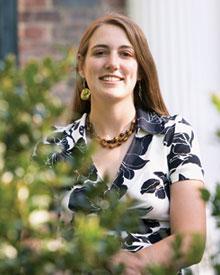 Sarah Harper ’07 is the new Hitchcock Fellow in the athletics department. |
By Rebecca Binder ’02
They say that the true character of a person comes out on the golf course. If that’s the case, then Sarah Harper ’07 has nothing to worry about. Over the course of her Amherst career, Harper posted outstanding golf and squash statistics and earned the respect of her teammates, coaches and opponents. Harper’s true character also comes out, though, off the course and away from the court. In addition to being one of last year’s most successful Amherst student-athletes, Harper has left her mark all across campus.
When head golf coach Michelle Morgan first met Harper, the coach knew that Harper would build at least a reasonably successful career on the course. But Morgan says it was Harper’s sense of purpose that struck her especially. “Her game’s been this never ending ascension of success,” the coach says. “She’s climbed that ladder through an incredible amount of hard work and dedication. She’s a pretty special young woman.”
Early in her career, Harper became the bedrock of the women’s golf program. She was in her first year at Amherst when Kate Kuchefski ’04 and Emily Foran ’05 led the team to a 16th-place finish in the National Golf Coaches Association rankings and to nine top-10 tournament finishes. Harper took her cues from Kuchefski and Foran. Her sophomore year, Harper posted the team’s best score in four of the eight tournaments and earned a spot on the NGCA’s All-America Scholar team.
Harper didn’t let up after her sophomore campaign. She captained the team as a junior and senior. Her junior year, she was a force on the leaderboard: more often than not, she shot Amherst’s lowest rounds. She individually took fourth place at the NESCAC Championships in the fall of 2005. A year later she stormed back, taking first place by two shots in the fall 2006 conference championships. The team combined for a score of 360, good for third place. “I didn’t really expect to win,” Harper says. “The NESCAC has a lot of good golfers, and we tend to exchange wins. But it was a solid victory, and I worked hard for it.”
Over her senior season, Harper took home six top-five finishes. She climbed onto the NGCA East All-Region Team, and got the nod as a Duramed FUTURES Tour NGCA Division III All-America Honorable Mention. Harper finished out her career in style: she led the team into the NCAA National Championship Tournament, where she—and Amherst—finished in 13th place.
Amherst hadn’t visited the NCAAs since its third-place finish in 2002, and Harper sees the swing through the national championships as a sign of things to come. “We have a young team, and it was a great experience for them,” she says. “Now, they’ve seen the best of what’s out there, and they can take that confidence going forward.”
Morgan credits Harper with seeing to the details that make a group of athletes a team. “She’s that glue,” the coach says. “She engages her teammates in practice, out of practice, on campus, in the evenings. She’s been a natural leader for them, and they’ve really come together as a result.”
Harper had a similar effect on the women’s squash team. She picked up squash during her first year on campus, in between the fall and spring golf seasons. Originally, she used squash as a time-management device; she had, she recounts, too much free time in her off-season, and used a winter sport as a way to organize her day. Harper had a solid squash career: she inched her way through the lineup into the top five, and turned in reliable numbers. “To get to where she is from where she started—,” says head women’s squash coach Tom Carmean, “it’s really amazing.”
Harper’s not a natural squash player. She’s tall—6 feet, 1 inch—and that can make it difficult for her to move around quickly on the court. Harper compensated by developing an effective attack that let her hold her ground against more agile opponents. All told, the team put up strong enough numbers to qualify for the Walker Cup, fighting all the way to the C Division’s championship match at Yale University against William Smith College.
Amherst lost the championship match, but not without Harper turning heads one last time. She twisted her ankle mid-match, but instead of walking off the court, she got her ankle taped and kept playing.
Harper has also turned heads in the greater community. She spearheaded an initiative to collect the uneaten, non-perishable food—granola bars, sports drinks and the like—that athletes take on road trips and to donate it to the local Amherst Survival Center. With Athletic Director Suzanne Coffey’s blessing, the effort caught on. Other teams began donating their uneaten food, and the endeavor became routine. “There’s so much wasted food,” Harper says. “So much of it just gets thrown away. So I asked to set up bins outside the gym, and I recruited volunteers to deliver the food.” Harper will spend the next year as the Hitchcock Fellow in the athletics department, where she hopes to oversee and expand the donation program.
Harper’s community-minded slant extends beyond Alumni Gymnasium. One of her most treasured Amherst memories is of living in the Zü, the housing cooperative in Humphries House that supports local farms and community engagement. “The Zü,” Harper says, “is the best-kept secret on campus. It’s all about fostering relationships.”
After her tenure as the Hitchcock Fellow, Harper wants to teach high school Spanish. “So many kids say they hate math, when really, they just don’t like their math teacher,” says Harper, a history and Spanish major at Amherst. “I think that a great teacher can be really inspiring, and I want to be that force in such a crucial part of students’ lives.”